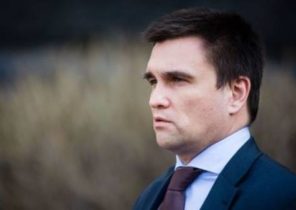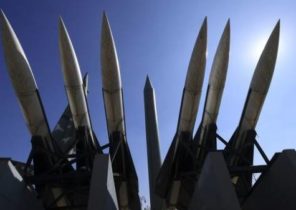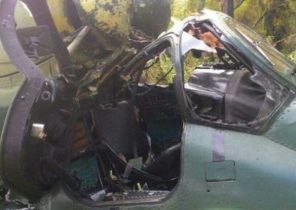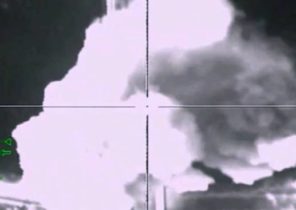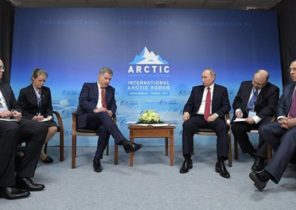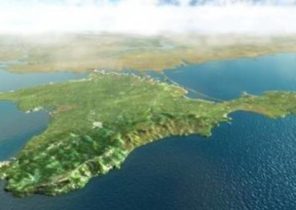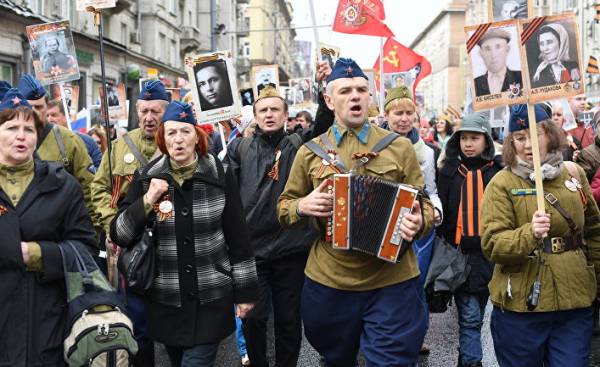
In the Windows of homes, on cars, baby carriages, and ladies ‘ handbags waving the ribbons — the symbol of the triumph of the people and military patriotism. Parades and military celebrations, children have a solemn line, and in kindergartens — “war games in the open air.” A lot of pathos, heroism, national pride and a demonstration of military power. The suffering of soldiers, civilians poverty, geopolitical intrigue and the brutality of the Stalinist regime — all the things that could tarnish the perfect image of Victory are carefully deleted from the content of the holiday. The Russians glorify your fabulous image of the great Patriotic war.
***
The writer Viktor Yerofeyev said that the Russians living in an alternate reality, which, of course, created for their power, but they themselves were approved and adopted. The need for myth was born out of an abundance of crimes of the past, sad present and gloomy prospects for the future. People who can’t handle reality, I bow before the myths that have come to replace the unbearable reality. The core of the mythological consciousness is the Victory Day.
Therefore, many inhabitants of Russia not only know, but also don’t want to know facts associated with the Second world war. More than 60% of Russians do not know about the secret protocols of the Molotov-Ribbentrop Pact or not believe in them, and only 13% believe the decision to sign the Treaty is wrong. Little interest in the Russians and the fate of Soviet soldiers: millions of soldiers killed on the territory of modern Russia and not waiting for burial; missing, wrongly considered as deserters, and therefore not rehabilitated. Few people realize that three years later, after the war, Stalin, the fear of “unmanaged” potential returning front soldiers stopped to celebrate the Victory. Celebration returned only in 20-th anniversary of the end of the war. The Russians also often turn a blind eye to the fact that veterans now often do not receive appropriate support.
The rejection of facts — it’s the price you have to pay for the delights of a mythological reality in which the Russians are becoming what they want to be good, important, warring for peace.
The myth of the great Patriotic war allows them to feel good. Once they were able to defeat the terrible evil that was Nazism, then they themselves become the embodiment of its opposite, turned into a just people who can get up on the bright side of the story. This idea applies not only to great Patriotic war and all other conflicts. In every war, in which Russia participates, but she is always on her side. Therefore, anyone who is at war with the Russian people, wrong by definition. In a symbolic sense he stands to the side “Nazis”. This was the case with the “annexation” of Crimea and “liberation” of Donbass: it is no coincidence that opponents on the other side of the barricades dubbed Moscow the “fascist junta”.
This mythical image of the great Patriotic war allows Russians to feel their importance, to overcome the complex periphery, “the backward state on the outskirts of the Western world”. After all, Russia freed the West from the evil. Most Russians believe the victory over Nazi Germany was primarily a merit of the Soviet Union was possible without the help of allies. They believe that the world, Europe is obliged to the heroism and sacrifices of their ancestors. It gives a modern Russia the moral right to participate in decisions about the fate of the continent and compels other people to treat her with respect.
Finally, the myth of the great Patriotic war gives the Russians the right to fight for the world. The people who sacrificed so much for peace, can not be peaceful. In Russian homes, in political speeches and movies for many decades, sounds the spell of “just war.” So, for the sake of the world the Russians have the right to apply any measures, including violence. Eloquent sounds in this context, the official name of the military action in Georgia in 2008: “operation on compulsion to peace”.
***
Russian representations of world war II can cause a sense of outrage. This is especially true in Poland, which came into contact with the darker side of Russian military action. However, the deconstruction of these myths, we need not to give vent to emotions, and in order to understand the problem we are dealing with and how to overcome it. Offer several insights which we should take into consideration.
What we are seeing in our regular relations with our big neighbor (inability to critically evaluate their operation, legitimization of military aggression, the demonization of anyone who dares to Express criticism of Russia) is the result of mythological thinking, the core of which is the myth of the great Patriotic war. The popularity of this myth stems primarily from the fact that the Russians can’t deal with its past (in particular, to recognize their own crimes) and to develop a positive vision for the future of the country.
Russian falsification of history, which is in Poland, so many emotions — it’s part of the same problem. This is not an intentional act of aggression directed against the poles, and the side effect of mythologizing of the past with its consequences for modern Russia.
Poland has almost no leverage in order to fix the Russian perception of reality. The Russians will cultivate myths until then, until we decide to remove the rose-colored glasses. In this process, which could take years, if not decades, a huge role is played by the few representatives of the Russian people who did not succumb to the charms of the fabulous version of reality and try to show the truth about the past, when faced with the resistance of the state and most citizens. Europe and Poland must give these people the most active assistance.
And finally, if we are interested in demythologized Russian consciousness, we should try not to answer their own myths: about the Messianic martyrdom of the Polish or the Smolensk terrorist attack. Otherwise we will find ourselves in Wonderland, in the Russian fairy-tale world, where the facts lose value, and the real problems closes the veil of myths. Therefore, we will not refund the Russians and Russia in reality, but only expand and strengthen the space of their mythical world.
